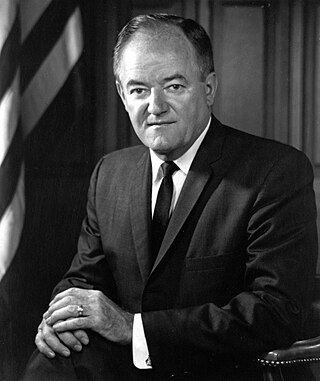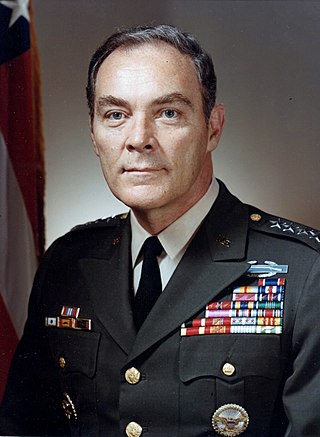
The 1968 United States presidential election was the 46th quadrennial presidential election, held on Tuesday, November 5, 1968. The Republican nominee, former vice president Richard Nixon, defeated both the Democratic nominee, incumbent vice president Hubert Humphrey, and the American Independent Party nominee, former Alabama governor George Wallace. This was the last election until 1988 in which the incumbent president was not on the ballot. This was also the last election where a third-party candidate received an electoral vote.

Hubert Horatio Humphrey Jr. was an American politician and statesman who served as the 38th vice president of the United States from 1965 to 1969. He twice served in the United States Senate, representing Minnesota from 1949 to 1964 and 1971 to 1978. As a senator he was a major leader of modern liberalism in the United States. As President Lyndon B. Johnson's vice president, he supported the controversial Vietnam War. An intensely divided Democratic Party nominated him in the 1968 presidential election, which he lost to Republican nominee Richard Nixon.

Alexander Meigs Haig Jr. was United States Secretary of State under President Ronald Reagan and White House Chief of Staff under Presidents Richard Nixon and Gerald Ford. Prior to and in between these cabinet-level positions, he was a general in the United States Army, serving first as the vice chief of staff of the Army and then as Supreme Allied Commander Europe. In 1973, Haig became the youngest four-star general in the U.S. Army's history.

Melvin Robert Laird Jr. was an American politician, writer and statesman. He was a U.S. congressman from Wisconsin from 1953 to 1969 before serving as Secretary of Defense from 1969 to 1973 under President Richard Nixon. Laird was instrumental in forming the administration's policy of withdrawing U.S. soldiers from the Vietnam War; he coined the expression "Vietnamization," referring to the process of transferring more responsibility for combat to the South Vietnamese forces. First elected in 1952, Laird was the last living Representative elected to the 83rd Congress at the time of his death.

William Pierce Rogers was an American politician, diplomat, and attorney. A member of the Republican Party, Rogers served as the 4th Deputy Attorney-General of the United States (1953–1957) and as the 63rd Attorney-General of the United States (1957–1961) in the administration of Dwight D. Eisenhower, and as the 55th Secretary of State (1969–1973) in the administration of Richard Nixon.

The Paris Peace Accords, officially the Agreement on Ending the War and Restoring Peace in Viet Nam, was a peace agreement signed on January 27, 1973, to establish peace in Vietnam and end the Vietnam War. The agreement was signed by the governments of the Democratic Republic of Vietnam ; the Republic of Vietnam ; the United States; and the Provisional Revolutionary Government of the Republic of South Vietnam (PRG), which represented South Vietnamese communists. US ground forces had begun to withdraw from Vietnam in 1969, and had suffered from deteriorating morale during the withdrawal. By the beginning of 1972 those that remained had very little involvement in combat. The last American infantry battalions withdrew in August 1972. Most air and naval forces, and most advisers, also were gone from South Vietnam by that time, though air and naval forces not based in South Vietnam were still playing a large role in the war. The Paris Agreement removed the remaining US forces. Direct U.S. military intervention was ended, and fighting between the three remaining powers temporarily stopped for less than a day. The agreement was not ratified by the U.S. Senate.

The White House communications director or White House director of communications, also known officially as Assistant to the President for Communications, is part of the senior staff of the president of the United States. The officeholder is responsible for developing and promoting the agenda of the president and leading its media campaign.

The 1960 Republican National Convention was held in Chicago, Illinois, from July 25 to July 28, 1960, at the International Amphitheatre. It was the 14th and most recent time overall that Chicago hosted the Republican National Convention, more times than any other city.

Richard Nixon's tenure as the 37th president of the United States began with his first inauguration on January 20, 1969, and ended when he resigned on August 9, 1974, in the face of almost certain impeachment and removal from office, the only U.S. president ever to do so. He was succeeded by Gerald Ford, whom he had appointed vice president after Spiro Agnew became embroiled in a separate corruption scandal and was forced to resign. Nixon, a prominent member of the Republican Party from California who previously served as vice president for two terms under president Dwight D. Eisenhower, took office following his narrow victory over Democrat incumbent vice president Hubert Humphrey and American Independent Party nominee George Wallace in the 1968 presidential election. Four years later, in the 1972 presidential election, he defeated Democrat nominee George McGovern, to win re-election in a landslide. Although he had built his reputation as a very active Republican campaigner, Nixon downplayed partisanship in his 1972 landslide re-election.
During President Richard Nixon's presidency, federal judicial appointments played a central role. Nixon appointed four individuals to the Supreme Court of the United States in just over five and a half years.
The presidency of Richard Nixon began on January 20, 1969, when Richard Nixon was inaugurated as the 37th president of the United States, and ended on August 9, 1974, when, in the face of almost certain impeachment and removal from office, he resigned the presidency.
The presidency of Lyndon B. Johnson began on November 22, 1963, when Lyndon B. Johnson became the 36th president of the United States following the assassination of President John F. Kennedy. His term ended on January 20, 1969.
The presidency of Dwight D. Eisenhower began on January 20, 1953, when Dwight D. Eisenhower was inaugurated as the 34th president of the United States, and ended on January 20, 1961.
The following is a timeline of the presidency of Lyndon B. Johnson from January 1, 1967, to December 31, 1967.
The following is a timeline of the presidency of Lyndon B. Johnson from January 1, 1968, to January 20, 1969.

The following is a timeline of the presidency of Richard Nixon from January 1, 1970, to December 31, 1970.
The following is a timeline of the presidency of Richard Nixon from January 1, 1974, to August 9, 1974, when, in the face of almost certain impeachment and removal from office, he resigned the presidency.

American diplomat Henry Kissinger (1923–2023) played an important and controversial role in the Vietnam War. Starting out as a supporter, Kissinger came to see it as a drag on American power. In 1968, Kissinger leaked information about the status of the peace talks in Paris to the Nixon campaign and was rewarded with being appointed National Security Adviser under Richard Nixon. As National Security Adviser, Kissinger sought initially to find a way to end the war on American terms. During his tenure, Kissinger came to differ with Nixon as Kissinger was more in favor of seeking an end to war as expeditiously as possible with minimum damage to American prestige. In October 1972, Kissinger reached a draft agreement that Nixon at first rejected, leading to the Christmas bombings of December 1972. The agreement that Kissinger signed in January 1973—which led to the American withdrawal from Vietnam in March of that year—was very similar to the draft agreement rejected the previous year. As National Security Adviser and Secretary of State, Kissinger favored continued American support for South Vietnam right until the collapse of that state in April 1975, which Kissinger blamed Congress for.

The presidential transition of Richard Nixon began when he won the United States 1968 United States presidential election, becoming the president-elect, and ended when Nixon was inaugurated at noon EST on January 20, 1969. Nixon had become president-elect once the election results became clear on November 6, 1968, the day after the election. This was the first presidential transition to take place following the passage of the Presidential Transition Act of 1963.
The following is a timeline of the presidency of Richard Nixon from January 1, 1971, to December 31, 1971.













